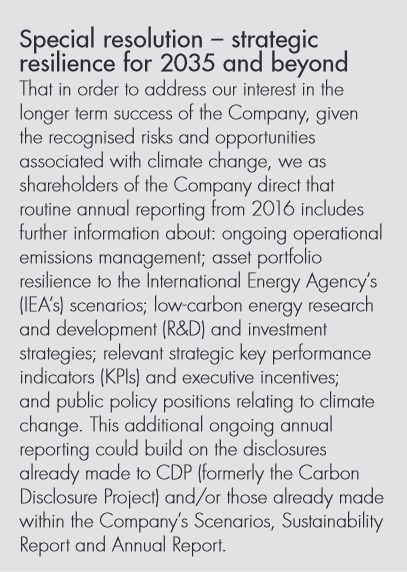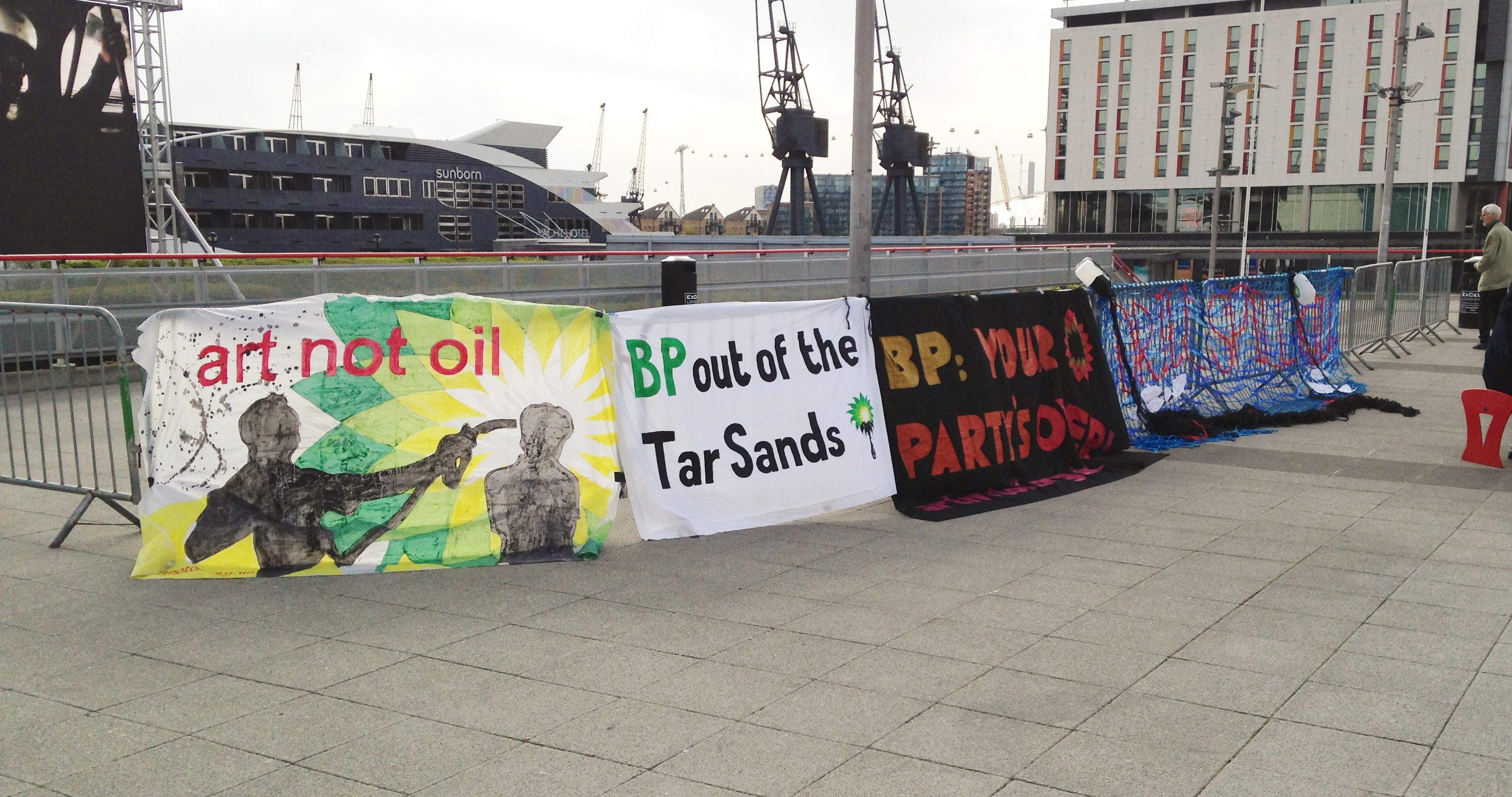A little bit of corporate history was made last month in London.
On the morning of April 16, and a handful of private shareholders milled about in the spring sunshine outside London’s ExCel Exhibition and Conference Centre. They were supporting ShareAction, a charity which helped bring them together with some of Europe’s (and the world’s) biggest pension funds to force the hand of oil giant BP on climate change.
For the first time, ShareAction said, the board of a FTSE 100 company has recommended shareholders support a special resolution related to climate change.
“BP’s decision to support and recommend shareholder approval for Resolution 25 is the example for companies to follow.” —Bill McGrew, CalPERSIn Resolution 25, investors had called for BP to ensure its portfolio of assets is resilient to the changing nature of the energy industry, with annual reporting to come in from 2016. They wanted more information on its development of renewable energy sources, its ongoing engagement with public policy on climate change, and how BP executives will be incentivized to complete the transition away from carbon-intensive coal and oil.
The resolution was co-filed by more than 50 institutional investors, including UK public pensions from Greater Manchester, West Midlands, and West Yorkshire. Finland’s Ilmarinen, three of Sweden’s AP funds, and the Connecticut Retirement Plans in the US also co-signed the resolution.
Following its publication, asset managers Schroders and AXA Investment Management expressed support for the resolution, and they were joined by asset owner heavyweights such as the Universities Superannuation Scheme, APG, Norges Bank Investment Management, and the California Public Employees’ Retirement System (CalPERS).
It was quite a roll call of support. These people meant business.
.jpg?n=239) The ShareAction team (and supporters) pose for a photo before attending BP’s AGM. (Photo: ShareAction)
The ShareAction team (and supporters) pose for a photo before attending BP’s AGM. (Photo: ShareAction)
A security guard eyed the rolled up banner suspiciously. “If you’re protesting, please do so over there behind that barrier.”
“We’re not protesting, we’re shareholders,” explained Matt Davis, director of communications at ShareAction. The guard muttered something about keeping out of the way, and sauntered back to the doors.
There was a sense of excitement among the group as 11:30 am and the start of the meeting ticked closer. After quick photo opportunity on the steps leading up to the conference building, and we headed inside.
As CIO negotiated a security gate more thorough than some international airports (and more polite—this is British Petroleum after all), there was a scuffle to the left. A young bearded man was being persuaded towards the exit. “I’m a shareholder!” he shouted as two guards virtually carried him out. He continued to struggle and protest that BP is stifling criticism: “I want to ask a question about why BP is exploiting the resources of…” And he was gone, before he could broadcast his message any further.
ShareAction’s approach was far more positive—“supportive but stretching”, as the resolution puts it—and less likely to result in any of its supporters being manhandled off the premises. The pension funds took their seats directly in the eye line of BP Chairman Carl-Henric Svanberg, who stepped forward to start proceedings.
“Our role as companies is to develop our business within that policy framework” created by governments, Svanberg said. “That is what we do best and where we can make a difference.”
Svanberg forecasted growth in energy generated from renewable sources to 8% globally in 2035, up from 2% today. BP is also planning to cut back on its coal business in favor of less carbon-intensive gas projects. “There is nevertheless a transition to a low-carbon future that needs to be managed,” he added.
For the next two hours, it was clear that BP has not stopped critics from getting in. Private shareholders quizzed BP on as wide a variety of topics as one can imagine. One made an impassioned plea for the company to cease operations in Russia until the Ukrainian situation is resolved. Another stepped forward to grill the board on its business in Azerbaijan. One former employee temporarily baffled Chief Financial Officer Brian Gilvary with a question about profits. And another shareholder asked why, when many had travelled a significant distance to attend the AGM, they can’t have a hot meal instead of sandwiches.
Eventually, we arrived at Resolution 25. By this point, many of the private shareholders had wandered out in search of the aforementioned sandwiches—they may not be hot, but they are free—yet the auditorium was still remarkably full.
continued…
Helen Wildsmith, head of ethical and responsible investment at charities investment manager CCLA, was the first to speak. CCLA has led the drive for institutional engagement with this issue along with ShareAction, through its “Aiming for A” project, named for the Carbon Performance Bands introduced by the Carbon Disclosure Project to rate companies’ transparency on emissions. (BP is currently rated ‘B’.)
“BP is a company on the ropes. They have to appease the shareholders.”Wildsmith was followed by Bill McGrew, portfolio manager at CalPERS, who speaks positively of the board’s engagement: “BP’s decision to support and recommend shareholder approval for Resolution 25 is the example for companies to follow.” CalPERS’ involvement is significant, as it holds roughly $390 million of shares. Paying lip service to this resolution will not be enough.
With the board’s backing, the vote was a landslide—98% were in favour.
 The resolution to be put to Shell shareholders on May 19.This
is just the beginning. ShareAction will be present in The Hague, in the
Netherlands, next month for Royal Dutch Shell’s annual general meeting (AGM), where a similarly large
and influential group of investors are to pitch a similar resolution to the oil
giant’s board. Just as BP did, Shell’s board has recommended shareholders
approve the resolution. Sweden’s AP2 and AP4 have had similar success with a
proposal to be put to shareholders of Statoil at its next AGM.
The resolution to be put to Shell shareholders on May 19.This
is just the beginning. ShareAction will be present in The Hague, in the
Netherlands, next month for Royal Dutch Shell’s annual general meeting (AGM), where a similarly large
and influential group of investors are to pitch a similar resolution to the oil
giant’s board. Just as BP did, Shell’s board has recommended shareholders
approve the resolution. Sweden’s AP2 and AP4 have had similar success with a
proposal to be put to shareholders of Statoil at its next AGM.
CCLA’s Wildsmith said she believed the BP result will be repeated at many AGMs in the “critical 2015 to 2020 climate policy-making window.”
Jenny Anderson, head of responsible investment at the Pensions Trust, said the investor coalition’s support “suggests a change in approach in terms of companies’ willingness to engage on this subject.”
Anderson was one of those present at the BP meeting, and told CIO that the company was likely “quite surprised” with the number of institutions represented.
“What is interesting is the chairman spent a considerable amount of time getting comments at the end,” she added. “It’s a positive indication but we will have to wait and see.”
ShareAction staff and friends were happily tucking into their lunches, buzzing with success, and already looking forward to a trip to the Netherlands in a few weeks’ time.
A former fund manager, in attendance as a private shareholder in BP, cast a more cynical eye on the meeting. “Look at the body language of the board,” he told CIO, waving a copy of the annual report towards the auditorium. “It’s a company on the ropes. They have to appease the shareholders.”
He had a point. The 2010 Deepwater Horizon disaster still casts a shadow over the business, with BP having sold huge amounts of its portfolio to meet the spiraling costs of the clean-up. With some elements still playing out in US court, the board cannot put a definitive figure on how much it all has cost, although the numbers mentioned in the annual report imply a total cost of multiple billions of dollars.
This is a company seeking to rebuild its reputation. While becoming the first FTSE 100 company to welcome a resolution on climate change disclosure won’t make up for the past, it is arguably a step in the right direction.
For the pension funds, acting now is important for similar reputational reasons. In the UK, pensions are under more media scrutiny than ever, and poor investment decisions or a (perceived) lack of care could cost them members’ trust. Last month saw the launch of the Climate and Pensions Legal Initiative, a joint project between ClientEarth and the Asset Owners Disclosure Project. It is designed to help individual pension members put pressure on funds to take these issues seriously, citing the “legal duties” of trustees and managers.
 Outside
the ExCel Centre, as the shareholders filed out, banners protesting against BP’s oil sands operations were displayed prominently on the fences marking out the
protesters’ zone. Oddly, no chanting protesters accompanied the banners, just a broad spectrum of people dispersing slowly towards the
buses and trains. Instead of marches and angry crowds, the real activists were inside
securing “a seat at the table.”
Outside
the ExCel Centre, as the shareholders filed out, banners protesting against BP’s oil sands operations were displayed prominently on the fences marking out the
protesters’ zone. Oddly, no chanting protesters accompanied the banners, just a broad spectrum of people dispersing slowly towards the
buses and trains. Instead of marches and angry crowds, the real activists were inside
securing “a seat at the table.”
They were welcomed by the board—and they won.
